You can now vote at www.amsubc.ca/elections! It’s quick and easy- remember to rank you choices for candidates. Please note that you only have 2 minutes to make your selections before it times out (yes, it’s really silly). I’m a little disappointed by how little advertisement there has been of this election, and how little effort has been put in to let students know that voting is going on, and to let them know where they should go to vote (so much Webvote confusion!). Also, the last debate will be taking place today at noon in Ike Barber- please come and see the candidates one last time. I will be posting my endorsements later today. Thanks!
Author: Neal Yonson
Neal Yonson is a native of Ottawa. He graduated from the University of Toronto with an Hon.B.Sc. in 2006 and will be happy to tell you about how things seemed to work more smoothly there. After traveling across the country for free (protip: strategically arrange grad school visits where they reimburse travel) he came to UBC to start a Ph.D. in chemistry. He was quite happy to avoid student issues until he found out how much it cost to go to the BirdCoop. Since then, he has been involved with a variety of advocacy projects.
Pit Night!
There was a somewhat peculiar piece of business at tonight’s AMS council meeting. Should AMS councilors be allowed to sneak into Pit Night via a back entrance after council meetings?
After receiving a number of complaints (from myself included; the Ubyssey also wrote an editorial), the AMS’s Business Operations Committee recently decided to disallow entrance to the Pit via the back door. By eliminating the greasing of palms at the back door, I hope that there will be no more motivation to keep the line at the front door unnecessarily long when the Pit is nowhere near capacity. It will also mean that money that used to go to bouncers for bribes can now be used for more beer! Good on the AMS for being responsive on this issue.
Thankfully, council found a way to fuck with it. A frivolously-worded motion was passed in 2005 outlining that at every third AMS council meeting, councilors could sign up to get preferential entrance to the Pit after the meeting. (They pass a Pit List around the room for people to sign up, then sneak them in a back entrance after the meeting is over.) At some point in time, this started occurring at every second meeting, and then at practically every meeting. Chris Diplock presented a motion tonight to rescind the not-entirely-followed 2005 motion. His motivation was quite clear: everyone should have to wait in line at the front door to get in, councilors included and that it sends the wrong message to reserve this privilege for themselves.
Surprisingly, Alex Monegro defended the practice. He argued that councilors, unlike paid staff, don’t get any renumeration for their many hours given to council. Perks, even very small ones like this, are deserved and should be kept intact. Yikes, I sure hope this is not indicative of his leadership potential.
An engineering rep also argued that being at council meetings meant missing social activities and that preferential entrance to the Pit eased that problem. The rest of the debate was either about indifference to having the Pit List/in support of equitable access.
Side note: If you are not an AMS hack (yet you read this blog, a peculiar combination), you might be amazed that something idiotic like this gets so much debate. Alas, the whole meeting went for more than 6 hours.
Unfortunately, I didn’t get a chance to speak before the question was called. The whole thing seemed like a pretty clear case of whether council wanted to put their own interests in front of those of ordinary students who just want a night out at the bar.
Major fail. In the end, council inexplicably decided to keep the Pit List intact, for them alone. I know this isn’t the first, nor the last, nor the most blatant display of self-interest, but I’m pointing it out anyways. Despite the result, I hope to never see the Pit List passed around again. I’ll be watching.
As a member of Jeremy Wood’s facebook support group (and please note: I support everyone in the elections if they have a facebook group and invite me to join it), I have received a message with the following excerpt in my facebook inbox:
Just a note: I’ve heard a lot of you saying that after me you would put Johannes Rebane as a second choice. Given the new condorcet system of ranked voting this is a dangerous choice! Johannes has a lot of his own support and unless you guys put him as your 4th preference, you’ll only be helping him out.
Now, I understand that this is an election, and that it’s being run somewhat differently. However, I fully do not support these sorts of statements. Dubbing someone a ‘dangerous choice’ simply because you don’t believe in his ideas is a bit extreme. It also makes his seem afraid of a the candidate, which I feel is a weakness- I want someone who won’t resort to these kinds of tactics in an election. For shame. Yes, there may be strategic voting involved, but what happens if you put someone competent fourth just because you’re afraid they’re your biggest competition? Biggest competition often (although not always) means that they’re a competent, capable candidate- and putting them fourth only messes up the system. Not that I think it will matter in this race.
Also, this is coming from a candidate who pulled out of the race to then come back in. I know that Kerry was a flip-flopper, but even he didn’t go to these lengths. It doesn’t say too many good things about a candidate’s motivation if they only re-enter a race because their friends/supporters told him to- it means, despite what he may say, that he lost the will to do the job and had to be encourage by people who were ideologically aligned with him to convince him to go back. I think it means that he wasn’t that firm in his stance, and that he wasn’t doing it to improve the system or represent students. If a candidate is dedicated to his/her cause, it means that they want to change the system, and their ideas are important to them, even if they’re not important to others. Someone who can’t hold his own and relies on others to persuade him to continue to run makes me worried about how he’ll react if everyone else is opposed to his ideas if he is elected- in this case, I’d be worried that he’d give up on his plans. And by “he”, I don’t necessarily mean Jeremy- I mean any candidate who is elected into a position. But it applies in this case as well.
Condorcet voting
Due to a hole in WordPress, this post’s author is misattributed. The follow was written by Maria Jogova.
A brief explanation, in case people don’t quite know what it is.
1. You rank the candidates on the ballot. Tied rankings are allowed, as far as I know.
2. Each candidate is compared to the other candidates on the ballot.
3. The votes are counted by pitting every candidate against every other candidate in a series of imaginary one-on-one contests. The winner of each pairing is the candidate that the greatest number of voters preferred. Each voter’s preferred candidate is the voter that ranks highest on their ballot. For instance, take the race between Ale and Tom. They are paired against one another, and the number of votes where Ale is ranked higher than Tom are counted, and then the number of votes where Tom is ranked higher than Ale are counted. If Ale is preferred by more voters then she is the winner of that pairing. If Tom is the one preferred, he wins that pairing. In this way, all pairings are considered. If one candidate beats every other candidate in these contests then they are declared the Condorcet winner.
Hope that makes sense! Didn’t have time to post this earlier, but take that into mind when you vote. I personally like this system- while it means that popularity sort of still trumps the system, I think it would be beneficial in races where there are either two people getting elected to a position, or else when there are no amazing candidates and voters might actually have to think about who they vote for and consider things like platforms and stuff if they take the time to learn anything about the election- it essentially encourages being informed. Obviously it’s not perfect, and people will still vote for whoever their friends are, etc. I just really like the choice of being able to indicate my preference for candidates, because sometimes it’s not all that clear-cut of a choice to make.
Debates, January 27
Today’s debates were definitely the most sparsely attended, as seen here: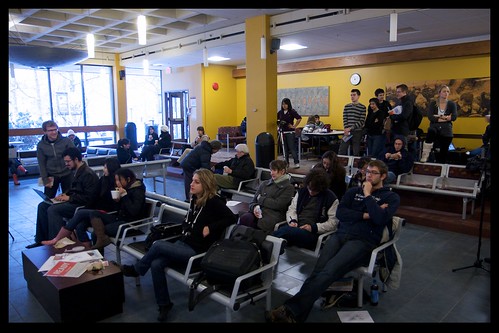
It’s too bad this debate was empty; I thought this was the best chance to get a feel for the candidates, since they’d had a chance to thoroughly adjust their platforms and approaches.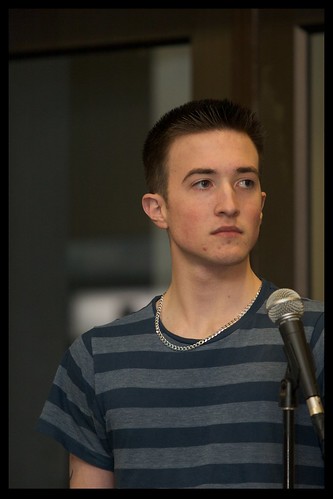
VFM Coordinator Mitch Wright moderated the debates, as AJ was apparently nowhere to be found. He did a capable job, once again requiring candidates to stay within their timeframe, but unfortunately continuing the tendency to disallow actual debate.
First up were the presidential candidates: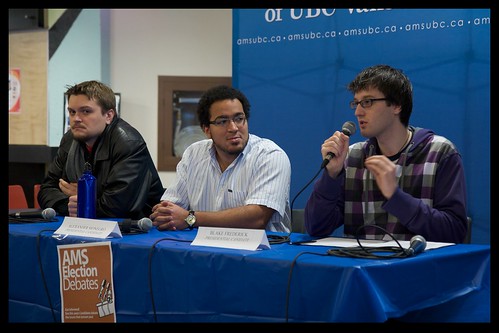
After a week of speaking, I felt that they were (finally) on top of their game. Blake’s core message was, as Naylor put it, “I am experienced and not crazy”, a far cry from his fiery showing at the first debate (which he tempered with an interesting personal anecdote about familial and socioeconomic barriers to university). Alex moved away from his earlier focus on facilitation and team leadership (which are, admittedly, an important part of the role) and opened with commentary on education and engagement. Paul retained and reiterated his desire to communicate and lead via consultation.

Paul clings to his outsider status, and resultantly I still don’t understand how proclaiming your lack of operational and institutional knowledge of the society you aim to lead can be spun as a positive. The AMS is a complex and occasionally infuriating organization to work with and/or for, and every day on the job spent learning the ropes is a day that could’ve been spent getting the job done. Michael Duncan’s immense knowledge of both people and procedure within the Society allowed him to very effectively use his time in office and I don’t see Paul being able to carry that forward.
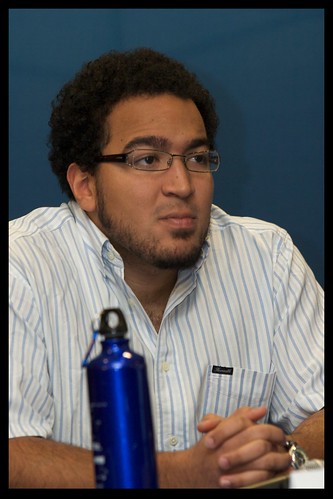
As I’ve watched more debates and read through more material, I’ve come around to liking Alex more. I spent a year as the President’s Assistant, allowing me to see a lot more of the daily happenings in the Executive Offices than most people, and with that in mind Alex’s focus on teambuilding and stress on inter-Executive relations while maintaining personal goals and focus items seems both achievable and sensible. While nothing he’s said struck me as particularly soundbite-worthy, Alex has a good grasp on the challenges ahead of him. His platform as presented doesn’t really say anything, which is sort of strange.

I like a lot of what I hear from Blake, but I don’t know how much of it is possible. It’s clear that he isn’t afraid to play politics, although his occasional tendency to trip over himself could cost him in heated discussions. Blake has a lot of institutional knowledge from his years as AVP Academic and AVP External, but I’m unsure of his abilities to shape a team from a group of people who had just emerged from the concentrated antagonism of elections. Combine with his desire to run for Board and his singular approach to peculiar difficulties of doing either job, let alone both, and I’m left standing in the “damnit Blake you’d be a shoo-in for VPX” camp.
The other debate today was for the two Board of Governors seats: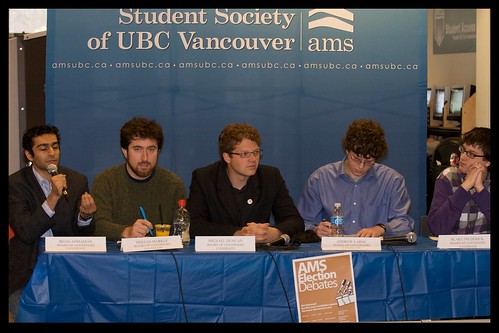
from left to right we have: Bijan Ahmadian, Tristan Markle, Michael Duncan, Andrew Carne, and Blake Frederick.
Bijan remains mired in his farm endorsement trading scandal. When pressed, he gave basically the same statement as was sent to the VFMs yesterday, and when Serious Steve asked him if he was, right now, committed to the Farm in its current size and location, he demurred and said that he would need to learn more about the farm before making a decision. I’m also curious about his workload; as a combined JD/MBA student, Bijan is taking 131 credits of graduate study over four years (per the Sauder MBA/JD website) to complete two professional programs simultaneously that are far from easy on their own. Frankly, I find it hard enough to make time for everything I do as an undergrad and have serious doubts as to whether Bijan would be able to work out all his commitments, or if something will give (and what that will be.)
Tristan continues to underline the importance of the SUB Renew project, and also uses it as a pivot to increase student engagement and empowerment on campus. His BoG projects intersect with his reelection plans in the VP Admin spot, and while he did suffer a bit of platform overlap (collision?) with Michael Duncan, he was able to stand out from the pack of other candidates. Bijan attempted to lay blame for the freeze in negotiations on SUB Renew since November at Tristan’s feet, but Tristan was able to explain how it was a necessary tactic and one approved by council (as per Naylor) but Tristan let slip some items that were discussed in camera which is unwise in the best case and litigatable in the worst.
Mike presented a lot of successes from his Presidency and some goals for his BoG term. As mentioned above, he’s had a strong year in office and wants to carry that momentum forward, along with his experience with multiple levels of administration and unique ability to engage. I hope he doesn’t show up at BoG painted blue.
Actually, no. I hope he does; I just want to see what would happen.
Andrew was unable to make it to the first debate due to his involvement at the Western Engineering Championships in Regina. He provided a strong showing at this debate, informing students of his attendance of Board meetings out of personal interest for the past 1.5 years, his plans to more effectively communicate about the Board to students, and demonstrating the strong, informed voice he wants to bring to the Board to represent students.
Blake’s BoG plans dovetail neatly with his Presidential ones, which led to a question about how he plans to balance the workload and focus of both roles. The question didn’
t really get an answer, which was disappointing; while Blake did point to Jeff Friedrich (President+BoG 2007-08) as an example, there were no ways or means given. Blake did, again, temper his speech from previous debates, choosing to focus on development and Farm issues rather than his prior goals of reforming governance and changing the way students are seen by administrators. I can’t tell if he’s worried about claims of idealism or if it’s a simple rethinking; either way it’s a lot less interesting.
The IBC responds
Response by Jason Ng to the statement made by AMS Candidates:
Several AMS elections candidates recently issued a statement claiming that we did not speak with them prior to issuing our endorsements for this election.
The International Business Club reviewed all the candidates’ platforms, including those of the 6 candidates who issued the statement. Their platforms, as well as detailed discussion of them, are available online through their websites, Facebook groups, and through the AMS elections blogs.
We did not claim that we spoke with all of them. If the original wording on this page was misleading for the candidates, we sincerely apologize.
Our post on this page has been updated to clarify our position.
Best regards,
The International Business Club Team
Jello wrestling
Jello wrestling is happening tomorrow (Wednesday), contrary to the day listed in the poll. I would encourage y’all to come out and support Science week, even if you aren’t science students. Perks include free entertainment, watching live wrestling, and potentially (and hopefully) seeing some of the AMS candidates duke it out in the ring. I mean, pool. Of Jello. It will be awesome.
[edited to add: I’ll be there! Say hello? -gerald]
An interesting statement
I recently received an emailed statement made by some of the candidates running in this election. The statement is as follows:
The following represents a joint statement by Blake Frederick, Paul Korczyk, David Nogas, Sonia Purewal, Iggy Rodriguez, and Jeremy Wood:
Recently, the International Business Club elected to endorse a number of candidates for Executive positions in the AMS races, claiming that their “executive team has reviewed the platforms and spoken with the various AMS candidates.” This is blatantly false. None of the candidates who signed their names here were contacted by the International Business Club. It should be noted that our complaint is not specifically with the individuals the club chose to endorse, but rather, the misrepresentation of the process as one involving an inclusive review complete with candidate interviews. In theory, there is nothing wrong with endorsing, or not endorsing candidates simply on the basis of their public statements and platforms, but it should be made clear what the process applied entailed. Students deserve to know the true nature of the process that is used to choose candidates for endorsement. Endorsements are a powerful tool for expressing particular viewpoints, but when they are issued claiming due diligence when none was done, their legitimacy must be called into question. We do not wish to attack the club, the candidates they endorsed, or their ability to issue endorsements. We seek to provide transparency of the process used to students through this joint statement, so that they will be informed as to the dishonesty used by the executive of the International Business Club when describing the methods utilized to determine candidates to endorse.
Now, I’m not sure if the club ever said that they interviewed those specific people- simply that they had “spoken with the various AMS candidates”. I understand how this may be misleading, however. My question is, however- do endorsements make a difference? I would argue that they might in an important election (for instance, I felt that Powell’s endorsement of Obama was significant- not statistically, but you know what I mean). But on a campus of several tens of thousands of students, most of whom don’t even know who most of the candidates are, let alone the endorsers, it seems like it wouldn’t actually play that big of a role. If you look at who tends to vote, and how they make up their minds, I find that most people either rely on those more knowledgeable than them to give them advice, or they may go and read candidates’ platforms/read blogs/go to debates, or they may be told by candidates or candidates’ friends to vote for them. There are very few people who are actually interested in the elections, and those who are tend to get informed- and I find that the more informed one is, the less of a difference endorsements actually make. If anything, they speak only of an issue of trust- that someone in an office trusts you enough to say that you’d be good in the position- and even then, the endorsement is powerful because it’s assumed that people reading it know who the person endorsing the candidate is, how well they’ve done their job, and how much they trust them. So really, it sort of goes back to being friends with a friend of the candidate and to being informed. At least, that’s my take. Unless, of course, you’re endorsed by Obama. Or Putin. Both would be kind of awesome, especially if they both endorsed you…
Having a business club endorse commerce candidates hardly comes as a surprise. Neither does the fact that some of their “research” was conducted over facebook- limited privacy settings sure are great for journalism! However, it’s their right as a club to go about doing their endorsements in whatever way they’d like- doing them wrong (and by wrong, I mean- not actually reading platforms, or not looking at other candidates) simply makes them lose their objectivity, which I find is important, although not always possible, when someone makes an endorsement. You just hope that bias motivates one to do better research- particularly that which involves looking into the other candidates.
The one thing I find rather amusing, however, is that had they not said that they actually had talked to the candidates, or implied that they’d done so (maybe even in person), this controversy wouldn’t exist. After all, there’s no way of checking to see if someone has read the platforms of the candidates- particularly not when they simply post a list of people they endorse. Secondly, given that it’s a club in which execs probably personally know some of the people running for office, should it really be all that surprising that they chose to endorse 3/3 commerce candidates, or that they didn’t look into the other candidates? After all, even if they’d done all their research, it’s still likely that their initial biases still colour their perception of platforms, no matter how objective they try to be. I understand that the qualm is about representing information accurately, but this isn’t something that can usually be proven- it just so happens that in this case, it was a blatant transgression.
Bruce Krayenhoff outlines benefits to students of voting in favour of the STV.
Why is the BC-STV Referendum So Important for Students?
First of all, research strongly suggests that more representative voting systems do result in better government, so students like everyone else will benefit from better, more stable and more accountable government if BC-STV is implemented.
However, there are a few reasons why BC-STV stands to be particularly beneficial for students:
First of all, voter turnout is about 9% higher in countries with proportional representation, and higher voter turnout generally means more even voter turnout, which means that students and young adults, being a low-voting demographic, are likely to turnout in substantially greater numbers. This will be a good thing in itself and it will force politicians to pay more attention to student issues and give the student voice considerably more clout in the legislature.
Secondly, being young and in a place of learning and ideas, many students would like more than two real choices at the ballot box. Indeed, if young people were the only people voting, the Green Party would be one of the major parties, but right now students who support the Green Party either waste their votes or vote strategically.
Finally, research suggests the implementation of proportional representation results in better environmental performance and lower unemployment, to name just a couple areas which matter to many students.
I have heard a number of students say ‘I think this referendum is even more important than the provincial election itself,’ and I have to agree. With a different party in power, we will see some change for the next four to eight years (i.e. until we vote them out again), but with a better voting system we will see lasting change for generations. Plus, a beachhead in BC will make the adoption of fairer voting systems throughout the rest of North America much easier to realize!
After a bit of a delay, Alex Monegro’s platform is up and running, and actually looks quite good. The platform outlines some interesting and important points. Below is some analysis of his plans for next year.
The first thing I like about Alex’s platform is his approach to issues that are of importance to students- things like hiring/tenure practices, text book prices, and tuition. In some ways, he seems to have realistic expectations of what needs to be done- he doesn’t talk about lowering tuition, for instance, but rather about curbing the yearly increases, which I appreciate. He also lays out concrete points that he wishes to pursue in order to achieve his goals, and I feel that his goals are both realistic and achievable. For instance, here’s what he has to say about textbook costs:
1. Work with student groups such as IBook Union to create more student driven book exchanges that will decrease book prices to a significantly lower level.
2. Document for students sources of cheaper, used books and learning material in order to decrease the Bookstore’s monopoly on the book market on campus.
3. Demand that the university explain how the high book prices contribute to the student experience on campus.
I quite like the first point- I don’t know if it’s something that has been looked into previously, but I feel like it’s a new idea. The second point and third points I’m not so sure on, however. While I like the idea of providing students with alternatives on where to get their books, I feel like most students already know. Furthermore, there are some things that he seems to lack knowledge of when it comes to the Bookstore- that their general book costs are driven up by classes in which required textbooks are not mass produced, and are therefore expensive. I’m also not sure about the monopoly on the book market- the Village bookstore, while technically not on campus, still provides books and is an alternative. As for the third point, most professors and members of the administration that I’ve spoken to on the issue are concerned about book costs. I don’t want to analyze every point to death, but I think the gist of it is that there are some good ideas and plans that Alex raises in his platform, but I feel that he does lack some knowledge about how things (like the Bookstore) operate. His point on hiring and tenure, for instance, would be a salient one if the university were already not looking at ways to change hiring practices- and they are changing, albeit slowly.
There are some things that, while well-intentioned, I felt were funny (even if they were true). Well, only one thing actually, and it was “Currently many students have to wait ten minutes or more at a bus stop to get on a packed bus.” Transit is definitely an important issue, and I am glad that it is addressed in his platform, but I feel like the plan he outlines neglects the problems that Translink is having with its system. When I last talked to a Translink employee, I was told that the problem with people having to wait/not having buses come often enough was caused simply by a lack of buses- that due to the UPass in part, demand exceeded supply. Another idea I liked: mixed-market housing, an approach that I haven’t seen mentioned by either of the other candidates.
There are a couple of things I wished I’d see more of, however. I was hoping to see a greater breadth of issues covered- particularly about what happens next year with the Olympics, or what happens if the TAs go on strike when their contracts expire next year. I realize the latter issue hasn’t really been talked about at all, but I feel it’s one of significant importance. I also would like to see a better understanding of how the AMS works. While some points lay out concrete ideas, other are much more vague or idealistic.
So in overview, my take on platforms is that Blake>Alex>Paul. Blake’s platform covers a breadth of issues, and he knows how the AMS works and uses that to his advantage. Alex’s also addresses some important issues, but the sense I get from that one is that he lacks the knowledge base, and while he can point out issues concerning students and offer some interesting ideas about ways to address them, he doesn’t have the depth of knowledge of the AMS and how it works in order to be able to work to get them achieved. And Paul’s is too idealistic for me, and doesn’t really lay out concrete plans for how to achieve his goals.